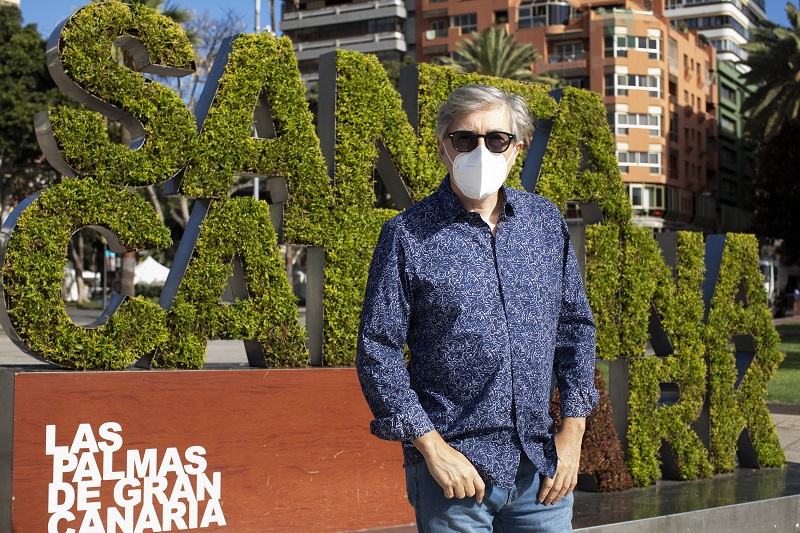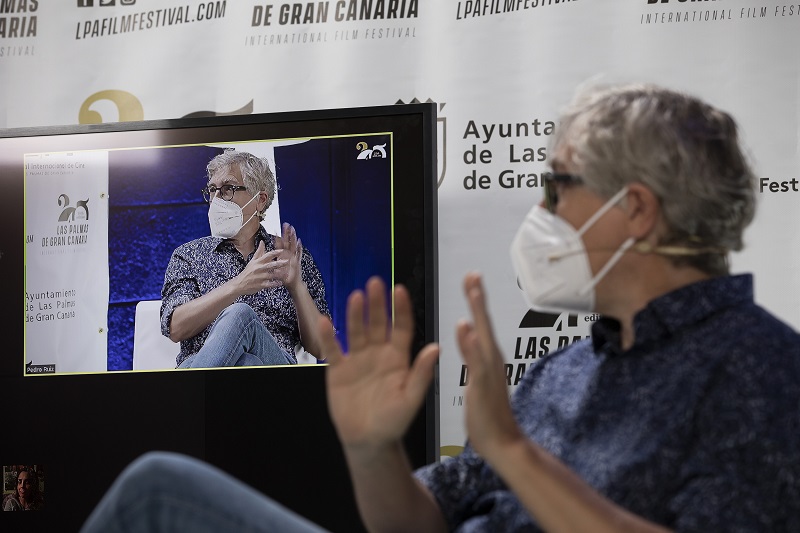The director and writer presents at the Film Festival his take on migratory drama with his latest work, a reflection with a documentary-like tone
The audience will be able to enjoy this double special session today Saturday at 6:45 on and tomorrow Sunday at 4:45 pm

Las Palmas de Gran Canaria. 10/04/21. 20 edición Festival Internacional de Cine Las Palmas de Gran Canaria. Pase gráfico y encuentro con medios del director David Trueba. Foto Quique Curbelo
Las Palmas de Gran Canaria, Saturday 10 April, 2021.- Writer and director David Trueba presents at the Las Palmas de Gran Canaria International Film Festival’s 20th edition his latest film A este lado del mundo, a reflection on the eternal migration conflict that is close to the documentary genre. This look at Melilla’s migratory drama and at its fence arrives to the Festival with two screenings scheduled on April 10 and 11 at Cinesa El Muelle’s screens, the first one including an introduction by the filmmaker.
It was a challenge and Trueba understood it. He wanted it to be a film with a classical exterior format, so it was shot in just two weeks in Melilla. A este lado del mundo is “a very guerrilla-like film because of the way in which it was shot”, but he wanted to be in Melilla. “Looking onsite at the fences is really impressive, seeing how it extends around the city separating two worlds “, claimed the filmmaker who manages to capture in his new film a very neat approach to the autonomous city’s coexistence with migration.
Starring Vito Sanz, Anna Alarcón and Zidane Barry, a youngster from Guinea Conakri who jumped the fences when he was fifteen years old, this modest film gets spectators closer to the reality of this drama through subtle touches of humor, while getting away from predictable plots or approaches and inviting spectators to observe and debate from an unexplored perspective.
David Trueba said during a press meeting on Saturday morning that the world makes technological, scientific and intellectual progress, but nevertheless there are still very primitive things. Building border fences so that people don’t get through is something that takes us back to 4,000 years ago and yet we haven’t realized that “that doesn’t work and is a mistake”, he regretted
“The more you make an entry access difficult, those who come go through another place”, he added. In that sense, he compared it with the situation the Canary Islands are living in regards to migration. “It’s the same thing they felt in Melilla when I was filming there”, he recalled, the feeling that they are abandoned and stayed on the border’s first line. Trueba wanted to stress that immigration is one of humanity’s biggest problems and “it should be faced with greater dignity”.
In Al otro lado del mundo, explained its director, “I wanted to make a film that wasn’t the usual way of tackling this problem from the journey’s epic point of view, of almost always managing to go through very positive African characters, sometimes cute kids with very pretty eyes who suffer a lot but, in the end, get to Europe”. “For me, those are films that accomplish one function: calming our European consciences so that we can sleep peacefully”, said the filmmaker.
His idea, he explained, was to put at the center of the film a somehow indifferent character representing the average Spanish person, who is not ideologically or socially involved in the migration issue. And how without realizing it, those people are used for the damaging and indignity campaigns which attempt to solve this problem and end up failing. Trueba wanted to change that point of view while “making it more uncomfortable for western audiences”. “I’ve always thought that in order to tell a story from a certain point of view, you need to know it, you cannot do it in an artificial or opportunist way, therefore we have to narrate this problem from within ourselves”.
Like in his books, where he goes from the first idea to the character, in Al otro lado del mundo’s case the first that came up was the character, whom he named “Mr. I don’t know” because he represented a lot of people, since nobody gave answers. The idea of how we end up being used just by being neutral comes from that, and “Vito’s character is someone like that, someone who doesn’t have a clear idea of what the migratory issue is and nevertheless gets a job offer he needs to do when he realizes that he is doing a job that contributes to maintain that status of violence, lack of understanding, of being a stopgap”.
He humbly admitted that he isn’t looking for social impact with this film, but he does attempt to be “a tiny drop that falls and falls reminding everybody that things are not as simple as they are told, but more complex and difficult, without an easy answer. You try to be a drop of water in front of the massive trend that says we have to live facing and fighting each other constantly.
Trueba’s film arrives to the Las Palmas de Gran Canaria International Film Festival after appearing at Malaga. This migratory drama is screening on Saturday 10 at 6:45 pm with a previous introduction by the director, and on Sunday at 4:45 at Cinesa El Muelle.
The Film Festival’s full program is available at lpafilmfestival.com, and tickets are on sale through their seats’ traditional portals: entrees.es for Miller’s programming (Camera Obscura, The Freakiest Afternoon and certain special sessions related to French filmmaker Chris Marker’s centenary anniversary); and at cinesa.es (Cinesa’s website), which offers the rest of the program, except for Déjà Vu, which will be screened at the Elder Museum of Science and Technology (where MECAS will be held, too).
Share this Post

